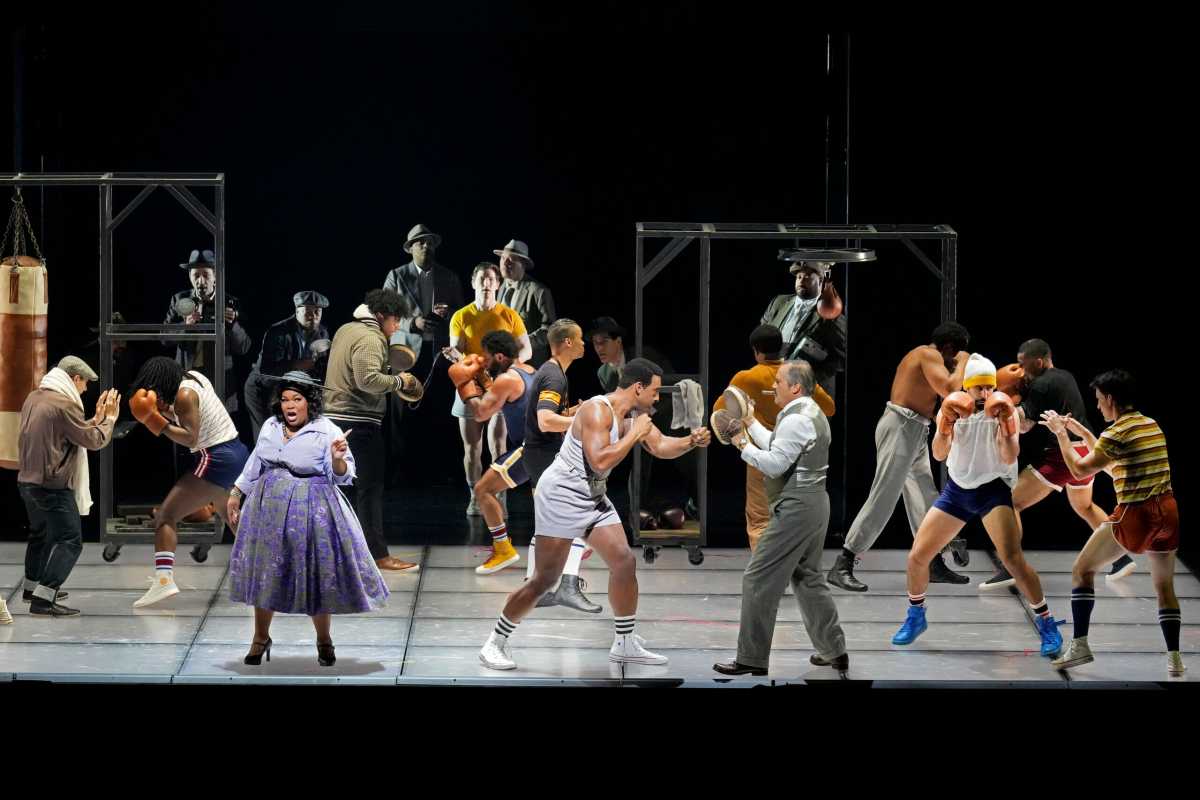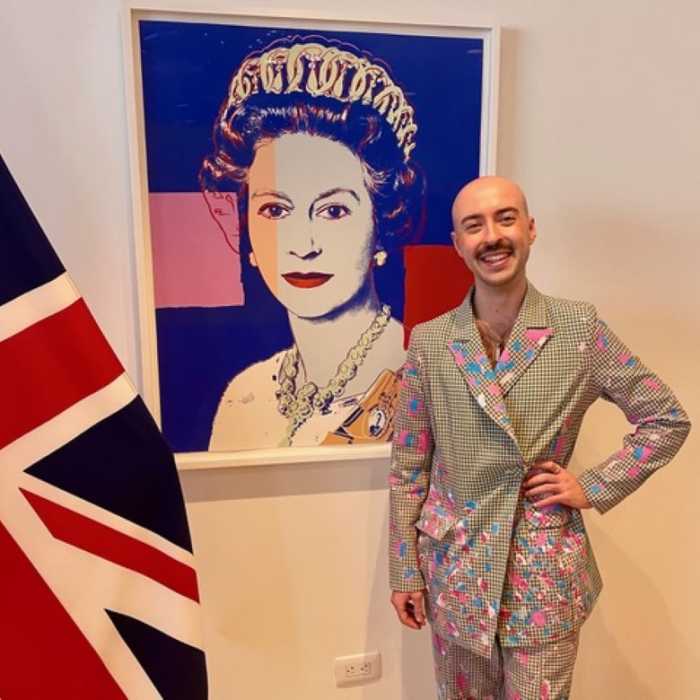The breaking news at the Metropolitan Opera this month is Terence Blanchard’s “Champion,” playing through May 13. Ultimately, the real-life story of bisexual boxer Emile Griffith and the tragic impact of homophobia on his career might have greater emotional impact in a Broadway-size theater, but it’s certainly a positive jolt to see a mainstage opera focus on a Black immigrant from St. Thomas.
Blanchard’s eclectic score pleases most instrumentally, though there are fine set pieces for the young Emile (a star turn by Ryan Speedo Green, in great vocal and physical shape) and his stereoypically drawn ‘bad girl’ mother (Latonia Moore, uneven but at best cathartic). Due to the management’s desire for a dance-filled, eye-popping spectacle, James Robinson’s supersized production sometimes overwhelms the intimate story at the piece’s heart, but has powerful moments and finely detailed performances by Brittany Renee, Chauncey Packer, Edward Nelson, and the amazingly versatile Stephanie Blythe.
Highlights of Met revivals include a rumbustious title role assumption of “Falstaff” (March 19) by ranking Wagnerian Michael Volle, a great success. His antics were genuinely funny, whereas some other cast members offered enthusiastic shtick, egged on by overbusy direction: needless slow-mo, added dance steps, and Alice’s \ radio — turned on but not, when the music stops, off. Fewer extras drawing constant focus would have been funnier.
The best otherwise were Ailyn Pérez’s elegant Alice and Carlo Bosi’s fierce-edged Dr. Caius, whose diction put everyone else’s to shame. Well-acted and musicianly, Christopher Maltman’s vocally colorless Ford lacked any Verdian quality. But the afternoon gelled due to the staging’s better ideas (like the Fords gleaming yellow 1950s kitchen) and, especially, Daniele Rustioni’s animating, idiomatic conducting. As in “Lohengrin,” the brass sounded terrific.
On March 22, longtime Met “cover” Helena Dix jumped in for Sonya Yoncheva as Bellini’s Norma — apparently the Australian soprano’s dream role, among the most difficult parts in the repertory. She arrived well prepared and, after a tentative “Casta diva,” fared unevenly but well, producing long streams of bright, beautiful sound and fine floated pianissimi. On little notice she duetted gracefully with her colleagues. No Norma has everything, and Dix lacks a well-integrated chest register, making the high priestess’s low-lying utterances rather brittle. Maurizio Benini’s inert, unhelpful conducting impeded. Unfortunately, the subsequent broadcast taxed her powers more. April 12’s “Tosca” casting benefited from Matthew Polenzani’s light-voiced but well-considered Cavaradossi, always drawing firm musical lines, as opposed to ample-voiced but stylistically provincial Ludmila Monastyrska and fading baritone Zeljko Lucic. Paul Corona’s Jailer easily took top honors among small roles.
On March 12, Harry Bicket and his top-notch The English Concert returned to Carnegie Hall in triumph, with the latest installation of their yearly Handel work tour: 1749’s very grand “Solomon,” too little known in New York. Unlike several oratorios, “Solomon” — a triptych of unrelated great scenes from the Biblical king’s reign, held together by frequent, ambitious choruses — doesn’t benefit from staging. Steven Fox’s fresh-sounding Clarion Choir proved a major asset; the playing was precise and superb, with particularly fine work from oboes, flutes and trumpets. Plus, all-in timpanist Pedro Segundo practically put on his own show. Brandon Cedel’s fine-voiced, imposing Levite showed far more agility than most bass-baritones. The only thing this proudly out singer yet lacks is the key ability — exemplified by such Handelians as Loraine Hunt Lieberson and Joyce DiDonato —to inflect the text’s many repetitions with new meaning every time.
Ironically, the cast’s two non-native speakers, Ann Hallenberg (Solomon) and Miah Persson (Solomon’s Queen/First Harlot), both Swedish, proved ideal in this respect. Hallenberg’s mezzo lies high for some of Solomon’s deeper utterances but she brought tremendous authority and vocal accomplishment to this great part. The gorgeous Persson, a shade less luminous below her shining top than when New York first heard her as Strauss’s Sophie in 2009, was very good indeed. All of 25, Elena Villalón (Queen of Sheba) showed a lovely voice and presence and should become a fine Handelian once she fully absorbs the style. James Way’s Zadok showed fluent machine-gun coloratura and admirably clear words, but was not outstanding for breath control or an ingratiating tenor. Niamh O’Sullivan was capable and duly nasty as the Second Harlot. A magical afternoon. Bicket and forces return to Carnegie December 10 for “Rodelinda.”
Carnegie hosted another splendid Handelian program April 13 when Bernard Labadie led his top-flight 30-person chorus La Chapelle de Québec with the ever-strong Orchestra of St Luke’s in a program devoted to music associated with British royalty. Beyond the familiar Fireworks Music, we heard the four highly melodic Coronation Anthems. The choristers dealt with the swift passagework as adroitly as the string players, and the trumpeters gloried throughout. 1713’s”Ode for the Birthday of Queen Anne” deployed three expertly stylish soloists: soprano Joélle Harvey, flawless in pitch and tone, Iestyn Davies (his countertenor not as seamless as usual) and clearly articulating baritone Sumner Thompson. Handel rules!
On March 15, Young Concert Artists presented another imposing, gifted, and out bass-baritone, featuring William Socolof in a striking Morgan Library recital. Collaborating with very solid Juilliard pianist Gracie Francis, he gave an admirably unfussy rendition of Ravel’s somewhat precious “Histoires naturelles,” a striking take on Mahler’s “Rückert-Lieder” and four well-chosen Schubert songs. His attention to words greatly outclasses many better-established young recitalists; an upcoming year at Cologne’s excellent company will clean up some errors in his German. Beyond a striking dark tone, Socolof displayed precise dynamic control and a well-honed sense of coloration: a career to watch.
David Shengold (shengold@yahoo.com) writes about opera for many venues.


































